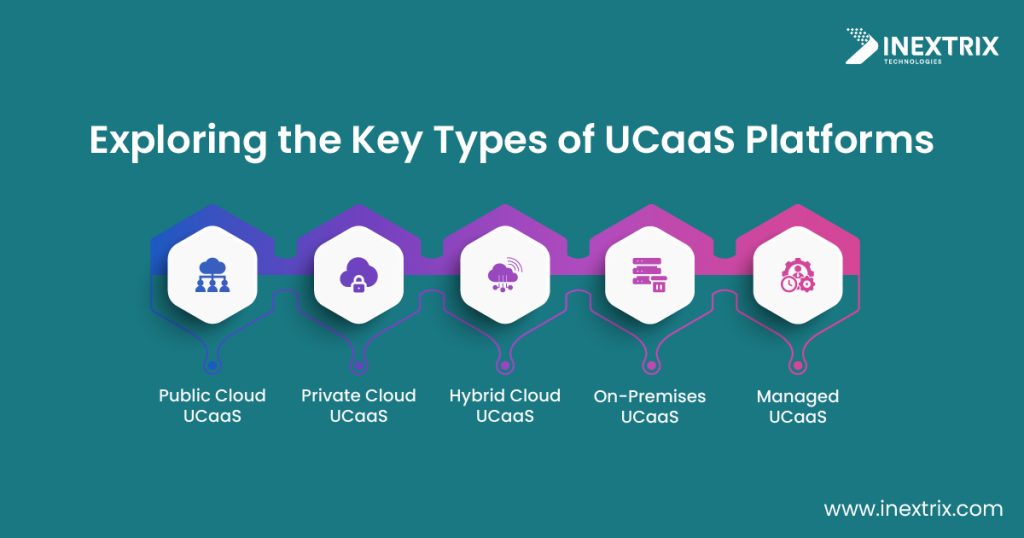Indeed, the notion of Unified Communications (UC) has emerged as a transformative force. Certainly, it promises to revolutionize the way organizations connect and collaborate. At its core, UC represents the integration of various real time communication channels into unified communications solutions. For example, voice, video, text messaging, and all other business and personal communication tools can be added to this platform. This amalgamation streamlines communication processes. Moreover, it enhances employee productivity, fosters collaboration, and supports mobility initiatives such as Bring Your Own Device (BYOD).
Today, UC solutions are offered in various forms, ranging from on-premises IT infrastructure installations to contemporary cloud based services. This flexibility enables organizations of all sizes to harness the power of unified communications to drive collaboration and innovation.
Traditionally, enterprises held the upper hand in leveraging advanced communication technologies. Undoubtedly, all thanks to their larger IT teams and budgets. However, the advent of cloud computing leveled the playing field, and it empowered small businesses to access the same cutting edge UC solutions as their larger counterparts. In this blog post, we will cover the complete insight about this interesting subject matter. So, let’s delve deeper into this buzzing topic in the telecommunication industry.
1. What is Unified Communication?
Unified communication (UC) is a process of leveraging the power of different communication channels integrated within a single platform. Certainly, UC revolutionizes business communication by consolidating various channels into a single platform. Additionally, it streamlines processes, enhances collaboration, and fosters productivity. Cloud based UC solutions are more popularly known as Unified Communications as a Service (UCaaS). These platforms democratize advanced communication capabilities, particularly for small businesses.
Transform your communication strategy with our innovative Unified Communication Solution.
As per the research report of Grand View Research, the global UC market reached $113.48 billion in 2022. Moreover, the report projects and indicates rapid future growth. In short, these communication solutions are essential for businesses embracing digital transformation and harnessing Artificial Intelligence (AI). They evolve to offer sophisticated features, plus, driving productivity and innovation.
Remember, Unified communications catalyze organizational growth and success. UC empowers businesses to thrive in dynamic business landscapes because it prioritizes user experience and productivity.
2. What is the UCaaS Platform?
The UCaaS platform is a software application that integrates various communication channels into a single solution. Certainly, it streamlines processes and boosts collaboration and productivity. As businesses transition to the UCaaS platform, they gain scalability and flexibility. Essentially, that is inevitable for adapting to evolving needs and growth trajectories.
UCaaS providers ensure that UC solutions facilitate seamless communication with external stakeholders. Therefore, it integrates this communication platform with popular applications for real time collaboration. This interoperability enhances team collaboration and customer satisfaction. The shift to remote work has accelerated the adoption of these communication and collaboration solutions. In short, these solutions are leading to unparalleled market growth.
UCaaS platforms facilitate seamless integration with existing business applications, like CRM systems. As a result, it optimizes workflows and enhances efficiency. This integration enables employees to access relevant information swiftly. Moreover, it improves response times and enhances customer satisfaction.
Moreover, a unified communication system operates on a pay-as-you-go model. Therefore, it allows companies to scale resources according to the demand. This flexibility ensures seamless adaptation to changing requirements and growth patterns. Additionally, UCaaS platforms boast robust security features, safeguarding sensitive data and ensuring compliance with industry regulations.
UCaaS platforms represent a transformative solution empowering businesses to optimize communication, collaboration, and productivity in a competitive industry. With their scalability, flexibility, and advanced security features, these communication platforms are indispensable for modern organizations striving to maintain competitiveness and foster growth.
If you are interested in learning more about customer experience tips, here is an interesting blog post covering all major tips to help improve CX effectively.
3. How do Unified Communications Work?

A UCaaS phone system allows companies to adapt and grow without hefty infrastructure costs. Small businesses seamlessly transition to remote work, integrate data, and deliver multichannel customer experiences. Moreover, integration with existing business applications such as a customer relationship management solution provides quick access to relevant information for customer service representatives.
Unified Communications (UC) Technology
Unified communications (UC) technology utilizes VoIP to enable users and enable them to make voice calls over the Internet instead of traditional telephone lines. Interestingly, this technology serves as the foundation for modern cloud communications platforms. Over the past two decades, various communication channels like instant messaging, SMS, and video calling have emerged. This has prompted VoIP providers to incorporate these features into their solutions.
4. The Functionality of Unified Communications

Definitely, it is worth knowing the functionality and related facts of modern unified communications solutions.
Seamless Communication Experience
A robust platform empowers teams to communicate seamlessly across different channels. For example, from messaging colleagues to video chatting with clients and making voice calls to vendors, it has all communication channels. Moreover, users can transition between channels effortlessly without disrupting ongoing interactions
Advanced Features and Integration
These solutions offer advanced features not found in traditional phone systems. For example, visual voicemail, paperless fax, mobile phone integration for call forwarding, and call recording capabilities are some of the popular features.
Additionally, integration with other business tools enhances the platform’s functionality. Therefore, it allows features like click-to-dial from shared files, automatic call logging in CRM, and screen pop-ups displaying relevant customer information during incoming calls. Moreover, these solutions are highly customizable and UCaaS providers can develop custom features for you.
Streamlining Channels and Data for Efficiency
The stated capability enhances communication and the overall operational efficiency of a business. Surely, these systems are typically supported by backend management systems known as UC platforms, which can be deployed on-premises or in the cloud (UCaaS).
User Friendly Interface for Enhanced User Experience
In addition to backend systems, a user friendly interface is crucial for effective UC implementation. Undoubtedly, user facing applications support various communication methods like voice calling, audio conferencing, SMS, instant messaging, email, voicemail, and live chat.
Seamless Integration for Enhanced Functionality
Generally, most of these systems offer seamless integration with existing business tools and applications, such as CRM software. Therefore, it enables employees to access historical records and initiate customer interactions directly from the CRM interface. Furthermore, integration with third party collaboration tools facilitates communication with external vendors or partners. Therefore, it enhances overall productivity and collaboration.
5. What are the Major types of UCaaS Platforms?

Definitely, a unified communication system is available with different features and functionalities. Let’s take a look at some of the major and popular solutions in this arena.
Public Cloud UCaaS
These platforms are hosted and managed by third party service providers in their data centers. They offer a scalable and cost effective solution for businesses of all sizes because users can access these platforms over the Internet without the need for on-premises infrastructure.
Typically, these platforms offer a subscription based pricing model. Therefore, it allows organizations to pay only for the services they use. Moreover, they provide automatic updates and maintenance. As a result, it ensures that users always have access to the latest features and security patches.
Ideally, these solutions are developed for organizations that are looking for flexibility, scalability, and ease of implementation. Particularly, they are suitable for small and medium sized businesses (SMBs) that may not have the resources or expertise to manage an on-premises UC solution.
Private Cloud UCaaS
They are dedicated to a single organization and can be hosted either on-premises or by a third party provider in a private cloud environment. Similar to a multi tenant IP PBX solution, this solution offers greater control and customization options. Therefore, it makes it suitable for organizations with specific security and compliance requirements.
With private cloud UCaaS, organizations can maintain greater control over their data and infrastructure. Certainly, it is essential for industries with strict regulatory requirements, such as healthcare and finance.
Certainly, private cloud UCaaS solutions may require a larger upfront investment compared to public cloud options. However, they offer greater flexibility and customization. Therefore, they make them ideal for larger enterprises and organizations with complex IT environments.
Hybrid Cloud UCaaS
It combines elements of both public and private cloud deployment models. As a result, organizations can leverage the flexibility and scalability of the public cloud while maintaining certain sensitive data or applications on a private cloud infrastructure.
This hybrid approach allows businesses to optimize performance, security, and cost effectiveness based on their unique needs. For example, organizations can use the public cloud for non-sensitive communications and collaboration activities. On the other hand, they keep critical data and applications on-premises or in a private cloud.
Hybrid cloud UCaaS solutions provide the flexibility to scale resources up or down as needed. Therefore, they are ideal for organizations with fluctuating workloads or regulatory requirements.
On-Premises UCaaS
On-premises UCaaS platforms are deployed and managed entirely within an organization’s own data center. This type of deployment offers maximum control and security because all hardware and software components are located on-site.
Unquestionably, these types of solutions require a larger upfront investment in infrastructure and IT resources for deployment and maintenance. On the other hand, they provide complete control over the UC environment. This makes them suitable for organizations with strict security or compliance requirements, as well as those that prefer to keep their communications infrastructure in-house.
On-premises solutions offer greater customization options and integration capabilities. As a result, they allow organizations to tailor the platform to their specific needs and integrate it with existing IT systems and applications.
Managed UCaaS
They are offered by third party service providers who handle the implementation, management, and maintenance of the UCaaS platform on behalf of the organization. This type of UCaaS allows businesses to outsource the technical aspects of UC deployment. Certainly, it will free up internal resources and expertise.
Managed UCaaS phone system providers offer a range of services such as initial setup, configuration, ongoing maintenance, monitoring, and support. Moreover, they ensure that the platform is always up-to-date, secure, and optimized for performance. Certainly, it allows organizations to focus on their core business activities.
Managed solutions are particularly beneficial for organizations that lack the in-house expertise or resources to manage their UC environment effectively. Unquestionably, outsourcing UC management to a trusted provider or organization can reduce IT complexity, improve efficiency, and enhance overall productivity.
6. What are the Major Advantages of UC?
There are several benefits of using this platform. Let’s take a look at the major ones:
Improved Collaboration
It facilitates seamless collaboration across departments and locations. Team members can easily communicate and share real time data. As a result, it increases productivity and efficiency. Moreover, it breaks down communication barriers and eliminates siloed data and human delays. As a result, it results in smoother workflows and improved decision making processes.
Better Customer Experience
UC empowers businesses to deliver exceptional customer experiences by offering multiple communication channels for interaction. Whether through voice calls, video conferencing, or messaging, customers can engage with businesses on their preferred platforms, enhancing convenience and satisfaction. Integration with CRM systems allow customer service representatives to access customer profiles and history in real time, enabling personalized support and tailored recommendations. Furthermore, features such as call recording and analytics provide valuable insights into customer interactions, enabling businesses to identify trends, improve service quality, and enhance overall customer satisfaction.
Lower Communications Costs
This communication platform consolidates communication services and provides a comprehensive solution having access to all communication channels within a single platform. Therefore, it results in significant cost savings for businesses. Moreover, VoIP offers cost effective calling, which further reduces expenses.
Concluding Note
In conclusion, UC platforms promise to reshape how organizations connect and collaborate. From improved collaboration and seamless integrations to delivering better customer experiences and lower communications costs, the advantages of UC are profound and far-reaching.
As businesses embrace digital transformation and strive to stay competitive in dynamic markets, UC emerges as an indispensable tool for driving growth and success. With the global UC market poised for continued growth and innovation, businesses have the opportunity to harness the power of UC to optimize communication, collaboration, and productivity. We offer the best unified communications solutions and several services related to it. To learn more about this service, contact us now.



